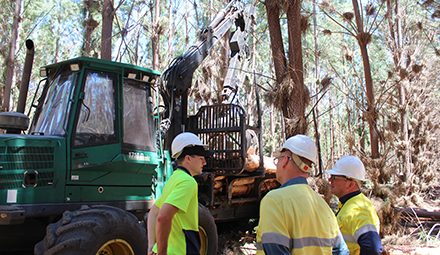
Tough new farm trespass laws to protect Australia’s farmers including wood processing facilities, from the unlawful actions of animal activists have passed both houses of Parliament. The Government amended the Bill to include wood processing however, forestry operations on Crown land was not included. Source: Timberbiz
Attorney-General, Christian Porter, and Agriculture Minister, Bridget McKenzie, said the successful passage of the Criminal Code Amendment (Agricultural Protection) Bill was an important safety measure for Australia’s dedicated farmers, most of whom are small businesses.
“This Bill was a top priority for the returned Morrison Government and was introduced in the first sitting of the new Parliament to establish new offences for incitement of trespass, property damage, or theft on agricultural land,” Mr Porter said.
“This Bill clearly demonstrates the Morrison Government will back our farmers against those who want to disrupt and destroy our farming, fishing and forestry industries.’’
The Australian Forest Products Association CEO Mr Ross Hampton said the broadening of the definition of forestry industries in the Criminal Code Amendment (Agricultural Protection) Bill to include forestry processing facilities such as sawmills and pulp and paper mills provides greater protection for Australia’s sustainable, renewable forestry industries from illegal protests by extremist activists.
“For decades forest workplaces have been subject to aggressive and damaging interference from activists with disastrous financial impacts on lawful businesses, despite Australia having some of the most sustainable, regulated forestry practices in the world,” Mr Hampton said.
“The inclusion of forestry in these new laws sends a strong message of support for the 80,000 workers in our sustainable forest industries that they should be allowed to go about their lawful business without fear of having their livelihoods compromised by illegal protests”.
The Criminal Code Amendment (Agricultural Protection) Bill, which creates a criminal offence under Commonwealth law if a person incites trespass, property damage or theft on agricultural land, comes with penalties of up to five years’ imprisonment.
“The near-unanimous support from the Government, Opposition and cross-bench for the inclusion of forestry sends a strong message to our farmers and foresters that our lawmakers understand how serious this issue is and are prepared to act.”
But Mr Hampton said it was disappointing that the Parliament could not agree to AFPA’s second recommended amendment for the inclusion of forestry operations on Crown land, which is subjected to the most aggressive extremist protests.
Senator McKenzie said the Bill reflected the Australian community’s expectations that farmers and their families should be safe from harassment in their businesses and their homes.
“This Bill criminalises the action of publishing material, via a carriage service, with the intention of inciting trespass, property damage or theft on agricultural land,” she said.
“It sends a clear message to animal activists that if you use the personal information of family farmers to incite trespass then you will be risking imprisonment of up to five years.
“Australians expect the farmers who feed and clothe us – and many millions around the world – should not be harassed, or worse, as they go about their work.
“The time has come for activists to understand that you can’t just descend on someone’s place of work and home, interfere with their business and steal their animals—and think that you can get away with it.
“When protests become acts of trespass and theft, you’re not a protestor, you’re a criminal and deserve to be punished.”
The Bill will be presented for Royal Assent through the regular process.





